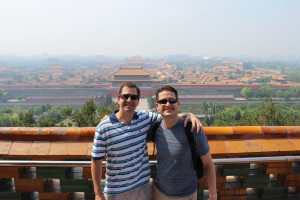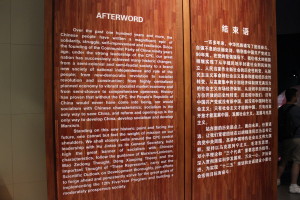Part Four: The Forbidden City of Facebook
In China, there is a different story about political freedom and the freedom of the press than there is in the United States. In China, the average citizen cannot even access some “foreign” websites like Facebook, Twitter, and YouTube. While we were in China, we could access just about everything from our email to a multitude of websites. We could turn on the television and watch CNN International and a wide variety of programs (including seeing our Miami Heat in the NBA Finals). But social media sites like Facebook? Those are forbidden.
During our time in China, my brother and I visited the Forbidden City, a great palace in the heart of Beijing. For nearly five hundred years, more than 24 emperors ruled over China from the imperial palace, otherwise known as the Forbidden City. During that time, the palace was the exclusive domain of the imperial court and dignitaries. The walls are high and no average Chinese people were ever allowed inside. They probably had no idea how complex and huge and beautiful it was inside. That was until the throne was abdicated in 1912 – when China went from an empire to a “republic.”

Later, in 1949, the “Forbidden City” was forbidden no more – as it became open to the public. And we felt fortunate that after all the centuries of commoners not being allowed through the gates and behind the walls, now anyone can enter, even foreigners like us. And it is a magnificent palace right in the heart of Beijing.
Today, however, some things are still forbidden to most Chinese – information and the ability to interact on social media, especially sites like Facebook, Twitter, and YouTube, where the freedom of information and social gathering on the web is unprecedented in human history – but not yet in China. Authoritarian governments all over the world fear the ability for citizens to engage in this activity as it has led to the democratization of information.
While we were in China, we actually had a few days where we could access Facebook through non-Chinese friends who had access to a Virtual Private Network (VPN) server. You can purchase this pretty cheaply and your computer connects to an IP address abroad, usually in the United States or Europe. We were told that technically this is not illegal in China, but that most Chinese people are not aware of it. Or, if they are aware of it, they would rather not take the chance to engage with sites its government does not want them on.
Most people in China will not talk to you about their government or politics generally. But I found the few people who did seemed to just have so much trust in policies enacted by their government. After all, China has risen over the past century and their government uses this success story to show that what they are doing has helped China reclaim its place among the leading nations of the world. The government also whitewashes their history to ignore the millions of Chinese who have died in the number of revolutions they have had to go through in order to achieve economic and political success in the world.

But I found it interesting that most people in China believe their government’s actions are for the betterment of China. I had one young Chinese person tell me they liked Americans; they just didn’t like our government. I chuckled and thought, ‘I don’t always like our government either.’ But I think what she said and what I thought were two different things.
I like the idea of what our government is supposed to be and absolutely detest the idea of what the Chinese government is. I also detest some of the intrusive actions our federal government has done in the name of national security and believe that our spying on journalists, on citizens, and meddling in the affairs of voluntary associations and political opposition groups have only weakened our moral superiority among the rest of the world.
When our government acts recklessly, as it did with the spying on journalists, it allows our enemies and adversaries to try to make a moral equivalent between a communist country like China and a constitutional republic like the United States (an actual republic, not a “people’s republic”). No matter what we think of an issue, like “ObamaCare,” for example, at least we are able to have a spirited public debate about it. Such open debates would not happen as freely, even in the more open China of today.
